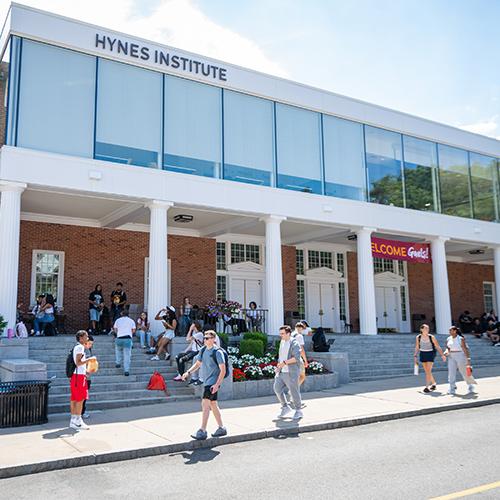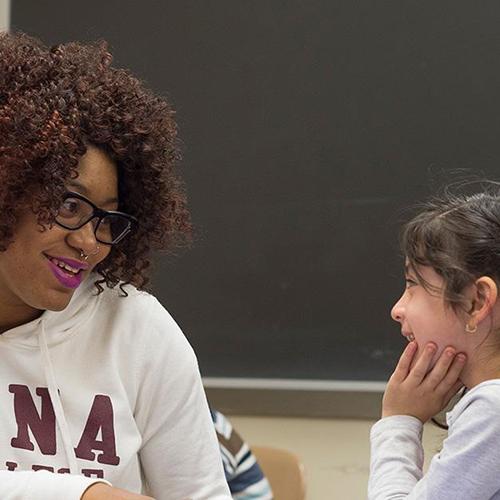How to Become a School Psychologist
Why Become a School Psychologist?
Looking for a career that brings fulfillment and allows you to make a difference in the lives of students? Becoming a school psychologist may be an exciting career prospect that aligns with your professional interests and strengths while also providing the opportunity to work one-on-one with children to address their needs and support a school’s overarching goals.
School psychologists play a vital role in the educational system, helping students overcome challenges — both academic and personal — to achieve their full potential. Through your work and dedication to students and their welfare, you can support their growth as individuals and be a part of cultivating a safe, inclusive and effective learning environment.
What Does a School Psychologist Do?
School psychologists hold a variety of job responsibilities related to monitoring, supporting and improving students’ academic performance, as well as their emotional and personal well-being.
To serve the diverse needs of students, school psychologists perform student assessments — identifying underlying cognitive or learning disorders — and then craft individualized education plans (IEPs) to provide actionable steps for students, their families and other school personnel. They monitor student progress and make strategic adjustments according to their plans to optimize students’ growth and development.
School psychologists also provide counseling services to offer support to children and adolescents dealing with emotional struggles, behavioral challenges or mental health issues. In more severe cases, they also assist in crisis intervention to handle student emergencies. This may include school-wide crisis prevention and education efforts to combat substance abuse, bullying and student drop-out.
Overall, school psychologists are instrumental in the promotion and creation of a safe and inclusive community where students have access to the care and resources they need.
What Do You Need to Become a School Psychologist?
Due to the complex nature of their work, school psychologists must receive proper instruction to prepare them to work with students who may be in vulnerable positions or require special intervention. Learn more about what it takes to launch this meaningful career.
Earning a Bachelor’s Degree in Psychology
You can begin your preparation for your future career as a school psychologist early by earning your bachelor’s degree in psychology. While not required, majoring in psychology allows you to build a strong foundational understanding of how humans develop cognitively, emotionally, socially, and behaviorally, which informs your advanced studies and how you engage with your future students.
In addition, you also receive essential training in ethics, statistics, research methodology and the application of psychological principles to various areas of human behavior. These courses ensure the continual development of your critical thinking and communication and analytical skills.
Gaining Experience through Internships and Practicums
In preparing to become a school psychologist, participating in internships and practicums is vital to proper professional development and skill acquisition.
During these experiential learning opportunities, you work in schools, supporting students and their families through different struggles. You put all of your classroom knowledge into practice, assessing students’ emotional, behavioral or cognitive needs, developing instructional interventions and support plans, collaborating with other faculty and parents, and reviewing the school’s data to evaluate their needs and opportunities for growth.
Along with your time working with students, you also partner with experienced professionals to receive one-on-one mentorship and begin practicing under their trusted supervision. This elevates your professional growth and helps you access knowledge that can only be learned while working in the field.
Obtaining a Master’s Degree
In addition to a bachelor’s degree, prospective school psychologists typically must earn a graduate degree in school psychology from an accredited college or university to work toward their permanent certification. While education requirements vary from state to state, pursuing a graduate degree ensures school psychologists undergo intensive training, practicums and hands-on skill development, properly preparing them to work in schools and one-on-one with students.
It is beneficial to select a school psychology program that is accredited by the National Association of School Psychologists (NASP), which works to maintain and improve the quality of school psychology education to provide students with the best possible care.
Acquiring School Psychologist Certification
Much like the different education requirements between states, school psychologist certification requirements also vary.
Some states allow individuals to obtain provisional certification with a bachelor’s degree, a set number of credits in psychology and a minimum amount of hours spent in a school setting, typically acquired through an intensive internship. However, other states require prospective school psychologists to earn their master’s degree before qualifying for a preliminary certificate.
In New York, individuals may obtain provisional certification after completing a state-approved master’s level school psychology program. Permanent certification requires the completion of two years of working experience in the schools.
What Skills Should a School Psychologist Have?
School psychologists play an integral role in a school’s overall success and the growth of their students. Since their position requires expertise in mental health, cognitive and behavioral development, crisis preparedness and intervention, and more, school psychologists’ skills must be broad and well-developed to ensure that children and teenagers receive the care they need.
To excel in this role, school psychologists should possess the following qualities and skills:
- Be adept communicators, who can easily collaborate with students and their parents or guardians, as well as other school personnel, and explain complex concepts in a straightforward manner.
- Excel at building trust and creating a safe environment for students
- Perform assessments and create personalized action-based plans, crafted following the student’s individual needs.
- Demonstrate robust active listening skills.
- Stay highly organized and detail-oriented while collecting data, assessing and monitoring student progress, identifying a student’s emotional, cognitive or behavioral issues, and maintaining accurate records and documentation.
- Remain dedicated to their students and motivated by their empathy and a sense of cultural competency to connect with students who come from diverse backgrounds and provide inclusive care and support for all.
Career Outlook for School Psychologists
With an ever-changing education system and a broad spectrum of student needs, school psychologists utilize their expertise, unique skill sets and compassion now more than ever.
The U.S. Bureau of Labor Statistics projects a promising career outlook. It estimates the employment of school counselors and psychologists to increase by five percent each year, translating to more than 26,000 job openings annually. Because student populations continue to grow, school psychologists remain in demand.
Salary Potential
Additionally, because of their specialized knowledge, school psychologists have the opportunity to make a stable annual income. The average salary for school psychologists in New York State is approximately $99, 750 according to the U.S. Bureau of Labor Statistics. Earning potential can range from $53,040 to $128,800, depending on their state of employment, whether they work in a public or private school and their level of experience.
Iona University’s MA in School Psychology
Become a school psychologist by earning your Master of Arts (MA) in School Psychology at Iona University. Our school psychology program, built upon an integrative and interactive curriculum, prepares you to work with students of all ages by honing your expertise in the social, biological, emotional and cognitive development of children and adolescents.
The MA in School Psychology provides practical training to develop solid and career-focused skills, such as counseling, conducting psychological assessments and program development, along with other essential competencies, which ensures you graduate as a qualified and effective job candidate.
Our program is fully accredited by the National Association of School Psychologists (NASP), thus our graduates are eligible not only for New York State certification but also for National Certification (NCSP). Furthermore, counselingpsychology.org recently ranked Iona’s MA in School Psychology as the #2 programs in the nation for 2023 for our comprehensive methodology, variety of program offerings and faculty experience.
If you’re an undergraduate student interested in becoming a school psychologist, pursuing your Bachelor of Arts (BA) in Psychology is an excellent starting point. Iona’s psychology major offers comprehensive training in the fundamentals of human development, behavioral sciences and a range of psychological disciplines. During your degree program, you gain the essential skills and expertise needed to excel in graduate school and the field of school psychology.
Take Your First Step to Become a School Psychologist
As a school psychologist, you work one-on-one with students to cultivate their academic and personal success by creating a learning environment where each child can thrive and grow into their potential.
Embark on the journey toward earning your master’s in school psychology by applying to Iona University today! Still have questions about our graduate programs? Request info to learn more.






